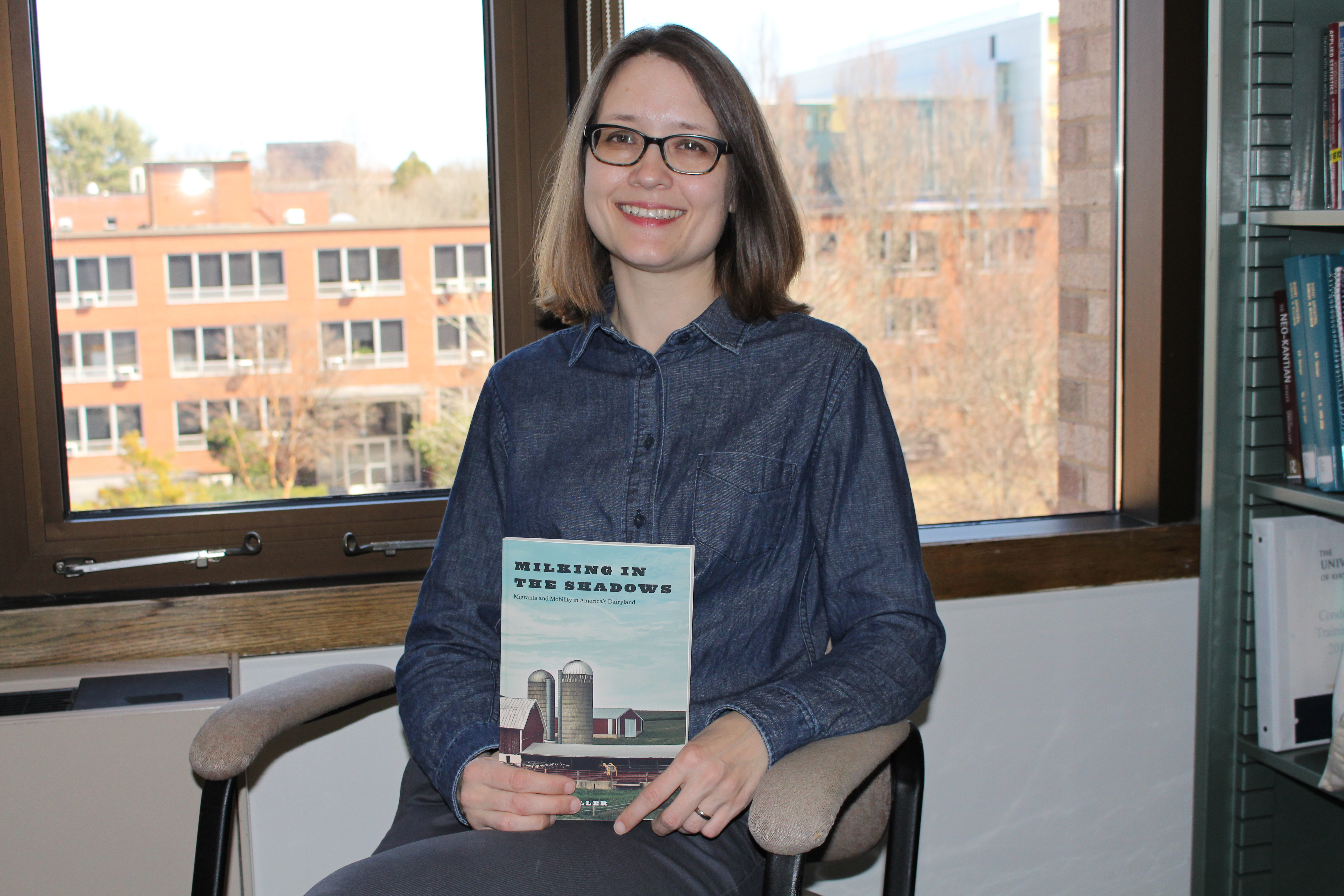Dr. Julie Keller poses with her new book that was nine years in the making. |Photo by James McIntosh
In January, Dr. Julie Keller, an assistant professor of sociology at the University of Rhode Island published her book, “Milking in the Shadows: Migrants and Mobility in America’s Dairyland,” which tells the stories of undocumented migrants living and working on dairy farms in rural Wisconsin.
The book also touches on the labor system and the sacrifices migrant farmers make.
Keller began working on this project while she was in graduate school at the University of Wisconsin-Madison and spent a total of nine years gathering information, conducting interviews and completing fieldwork.
Keller said that with the help of a professor, she decided she wanted to explore migrant workers who were filling jobs on dairy farms that were previously done by white European locals.
“It was this big shift that started in the early 2000s where suddenly you would begin to see more and more immigrants working, coming from Mexico primarily to fill these jobs on dairy farms,” Keller said.
According to Keller, these jobs were often low level, such as milking cows, scraping manure and cleaning up the barn. This big shift was interesting to Keller and she wanted to explore deeper into where the immigrants were coming from within Mexico, their stories and why they were drawn to come to rural Wisconsin.
Throughout her research, Keller conducted a total of 60 interviews. Half of these were conducted during a six month time period that she spent living in Mexico. In Mexico, she studied the villages, the social contexts and talked to workers who had worked in Wisconsin.
The other half of her interviews were conducted while she lived and worked in Wisconsin and gathered information from immigrant workers and farmers in Wisconsin.
Intrigued by this population, Keller also wanted to know if the migrant workers felt as though they were a member of the community, if they experienced any racism or discrimination and what life on the farm was like in terms of the working conditions, work schedules and pay.
“The other part of this is how many workers are undocumented,” Keller said.
Keller found that in her case, out of the 60 migrant workers she interviewed, 59 were undocumented. The only reason one person had some legal status was because they had a tourist visa. However, one cannot work on a tourist visa, so technically, all of the migrants in her study were unable to be work with a legal status, Keller said.
In Keller’s book, she talks about her discoveries which she describes as workers experiencing a paradox with their everyday movement.
“While farmers were definitely encouraging workers to come to Wisconsin to work on their farms and encouraging them to cross the border to work on their farms unauthorized, once workers got to this farm, it was a really tough situation because it was geographically isolating,” Keller said.
Because of laws prohibiting undocumented workers from getting a driver’s license, these migrant workers were being isolated from interworld functions, such as being able to go to the grocery store and buy food.
“I found that a lot of workers felt as though they were targeted by the local law enforcement just because of the fact that they were Latino,” Keller said. “Just for looking different, they felt as though local law enforcement were pulling them over because they were assuming that they would not be able to supply a driver’s license.”
Often in these case, Keller said that the migrant workers would end up in jail, have to pay a fine and were threatened that they would be deported.
“It was that paradox because farmers are encouraging them to come and cross the border and get north, but once they get there, their movements are really restricted in so many ways,” Keller said. “It’s a real issue.”
Keller said she hopes her book raises awareness for workers such as the migrants talked about in her book.
“I hope it changes the experience for people buying milk and I hope that after reading this book, people understand the lives of the people behind the milk who are actually responsible for milking these cows,” Keller said. “With bringing that lense of humanity, I’m really hoping for some kind of legal pathway to open up for these workers to have a legal status so they don’t have that cloud of deportation hanging over their heads at all times.
Keller teaches a course called New Immigrant Destination, which is Sociology 300, where she and her students study small rural towns in places such as Pennsylvania, Ohio and Wisconsin that immigrants have been migrating to where there hasn’t been a lot of diversity previously. In this class, they discuss many of the topics she delves deeper into in her book, and Keller said that she enjoys talking with her students about these issues.





